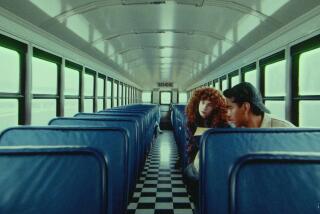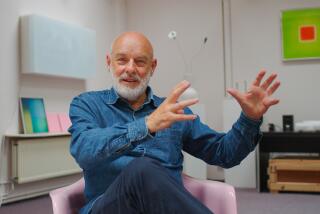Like Bach or Beatles, It Writes the Songs : ‘Jiffy Box’ Creates in Styles of Famous Composers
- Share via
JERUSALEM — Off in one corner of Yaakov Kirschen’s basement office here, colorful caricatures of the Beatles gyrate on a computer monitor as they play the songs that Paul McCartney might have written, but hasn’t yet.
Slip in a different floppy disk and it is Johann Sebastian Bach on the screen, back from the grave to compose new concertos before your eyes.
For the moment, these are the private “toys” of the eccentric Kirschen, who is better known to most Israelis as the creator of the “Dry Bones” cartoon strip in the Jerusalem Post.
But the technology on which those “toys” are based is no plaything. It is the basis of a new business, rooted jointly in Jerusalem and Long Beach, that is already creating a stir in the entertainment industry.
Kirschen is the brains behind Just For You Inc. and its JFY Post Production Music Generator. Known informally as the “Jiffy Box,” it is a computerized system for composing and performing original music.
‘Artificial Creativity’
The machine’s compositions are good enough so that when Kirschen submitted the computer-generated scores of a few of them, his invention became the first non-human member of the Israeli composers union.
And it recently had its commercial debut when the British Broadcasting Corp. aired a one-hour, prime-time special with an original, entirely computer-generated background score.
“It’s not artificial intelligence,” said Kirschen of his system. “It’s artificial creativity.”
“You definitely can produce new musical compositions with this,” said Jim Meechan, a Woodland Hills composer whose aR-Way Productions is one of the first to use a Jiffy Box. He estimates that the machine can generate original background music for a television or film production for half to two-thirds the cost of a product of equal quality produced by conventional methods.
A number of specialists are active in the field of computer music. An IBM researcher, for example, has taught a computer how to harmonize choral melodies. Given a soprano melody line, researcher Kemal Ebcioglu’s artificial intelligence program produces bass, alto and tenor parts that can be read on a computer screen and printed out in conventional musical notation.
Kirschen’s system goes beyond that, however, creating melody, harmony and rhythm from what the Brooklyn native described as the musical “genes” he has programmed into it.
“The premise is that music is alive, and anything alive has a genetic structure,” he said. “What the system does is to extract the ‘DNA’ from music and allows us to recombine it.”
Mimic Instruments
The JFY Box operator selects three “parents” for his original composition from a number of musical families programmed into the machine. He sets the desired duration of the piece, tempo and instrumentation.
Based on its analysis of the “parent” music, the computer then composes original scores on a foundation of the same genetic rules, sending signals to “black boxes” called samplers, or digitizers, that mimic the sounds of various instruments. And as he listens to the machine’s composition over a loudspeaker, the operator can instantly alter the result with a touch of the computer keyboard--a little more tension here, a bit of added levity there.
“It used to be that if you wanted to play a violin, you had to know how to hold a bow and where to put your fingers,” Kirschen said. Then, the introduction of synthesizers meant that “any musician that can play a keyboard can play a violin. We’ve taken it the next logical step: Anybody who likes to listen to music can now create music.”
True--in theory, Meechan said. “But music is music. Some sells and some doesn’t, and it all depends on who’s putting it in. . . . So I don’t see (the Jiffy Box) putting regular composers out of work at all.”
There are also significant restrictions in the present design on the length of the piece of music that the machine can handle, he added.
What the device does do, the Woodland Hills man said in a telephone interview, is “allow for a very sensible and pleasing piece of background music. And that’s what I think of it as, rather than as a composition tool itself. . . . That’s what I use it for and that’s what I think it’s good for.”
Instant Changes
It also can smooth the collaboration between a composer and the producer who hired him, Meechan added.
“I can (create a score) all alone, in my music room, then bring in the producer and let him hear it. He or she sits there and says: ‘Hey, I love that intro, but that part where it hits the film right where the action is, I don’t like that.’
“So I immediately can punch a few buttons and give (the producer) something different,” Meechan explained. “The two of us can fix it up instead of having a bunch of musicians around, going in the studio, knocking out a piece that I’ve composed, and then, if the producer doesn’t like it, you have to get the musicians and the studio and go back and do it again.”
Underlining the time advantages, the complete score and background music for the BBC’s “Demjanjuk Dossier” was produced in less than eight hours with New York-based editor Ron Frank describing his musical needs to Kirschen, who operated the JFY machine. The program, dealing with the war crimes trial here of convicted Nazi death camp guard, John (Ivan the Terrible) Demjanjuk, was first broadcast earlier this summer and is now in international distribution.
JFY, headquartered in Long Beach, does marketing and production of the equipment with Kirschen, operating here as LKP (Latest Kirschen Project) Inc., concentrating on research and development. The Jiffy Boxes are made in Walnut, Calif.
Known almost universally here as “Bones,” after the name of his cartoon strip, Kirschen, 50, has led something of a dual life almost from the beginning. He majored in fine art with a minor in business while at college and after graduation he worked simultaneously as a cartoonist for Playboy magazine and a consultant for International Business Machines and NCR.
His closest associates here are similarly eclectic. LKP’s general manager, Sally Ariel, is also a painter and film director. Its programmers include a movie cameraman and a musician.
Revolution Predicted
Ariel said 10 machines are in use, with negotiations under way for customers to buy several more. The music school of a major U.S. university is considering a Jiffy Box for one of its studios and has inquired about starting a course on its operation.
Not surprisingly, the man who sees the biggest future for the music generator is Kirschen. “This means there is going to be a total revolution in the way music is done,” he said.
Virtually throughout a two-hour interview, Kirschen produced, refined, and orchestrated new compositions on the machine, changing them within seconds by punching a few keys on a computer keyboard, sometimes at the direction of a reporter completely untrained in either computers or music. The resulting sound was always novel; its musical quality--in the reporter’s opinion--ranged from abysmal to passable.
With the Jiffy Box, Kirschen theorized, “a composer could work without performers or even a studio. On the other hand, a performer could work without a composer. Or a studio could work without either. The industry is going to have to deal with a massive impact,” he predicted, adding: “We probably are going to have zero control over what the world will do with this.”
Eventually he dreams of cracking the home entertainment market, where owners could use a modified Jiffy Box to enjoy a constant stream of original music. The arrangement in the corner of his office where the Beatle caricatures are still playing is one possibility. He calls it “Live Video.”
Using various Beatle recordings as “parents,” his machine analyzes musical patterns and then generates new songs according to the same rules. “We’re hearing all the music the Beatles never wrote,” Kirschen said.
He conceded that commercial use of such a system could entail significant copyright limitations. In theory, however, the possibilities for unusual combinations of musical styles are limited only by the “parents” programmed into the computer.
“We could make Japanese Bach,” said Kirschen. “We could make anything.”
More to Read
The biggest entertainment stories
Get our big stories about Hollywood, film, television, music, arts, culture and more right in your inbox as soon as they publish.
You may occasionally receive promotional content from the Los Angeles Times.










